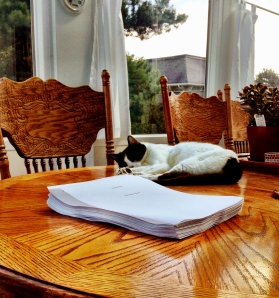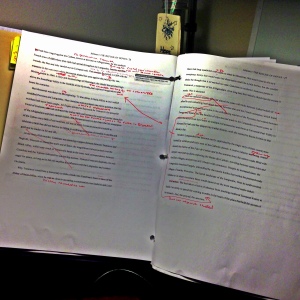Friday morning. Café. Rain. Quad shot Americano. It's early afternoon in Chicago. Here on the island, I check my inbox like a lab rat presses the sugar water lever. This craving for the e-mail from my editor. The e-mail with her responses to my five weeks' worth of edits on IN ANOTHER LIFE. The e-mail that signals the beginning of another five weeks of editing. Craving, yet dreading it, too.
I'm tired, feeling fragile. Sleep was elusive last night, although my restlessness allowed me to finish Tess of the d'Ubervilles and I surely could not have spared a moment's thought for my characters while Tess was wandering forlorn and forsaken in pages yet unread. I'm debating the wisdom of opening that e-mail when it does come. Tomorrow morning, after a solid night's rest and a peaceful hour of yoga, would be the smarter bet for my soul.
Maybe I shouldn't look at my e-mail for the rest of the day.
The past two weeks of freedom from the manuscript have been devoted to tying up loose ends before I dive back into the Slough of Revision: assembling 2014 forms and receipts for the tax preparer (can you believe it, I found someone who works with writers!); preparing two writing residency applications; making dentist, optometrist, and doctor appointments that I've pushed down the to-do list to the next week or the one after that; emerging from my cocoon to see friends, send thank you notes, connect with family, bake bread, go the movies.
I've also been working on TUI, my third novel. I think longingly to a year ago, when THE CROWS OF BEARA poured out of me, unfettered by other obligations, free from competing distractions. The story flew from my fingertips with such certainty: 105,000 words in ten weeks.
What a different writing experience this time, in part because I had to set TUI aside for so long and I'm about to set it aside again. In part because the storytelling itself is different—deeper, more personal. There's something I'm reaching for and I won't get there in a first draft. I won't know the layers I need to uncover until I see the whole of it spread out before me.
This is something new, this switching of writing gears from revision mode into first draft creativity, this distraction caused by the business of writing—all the thinking about websites and blog tours and blurbs and head shots and author platforms.
If I'm fortunate and THE CROWS OF BEARA sells, I will be in a cycle of writing-revising-promoting for the foreseeable future. What a gift that cycle will be in sustaining a viable career, but it's something I will need to learn to manage: making the intellectual and emotional leap from one work to another, from one type of writing to another, scraping together the free moments—whether for a day or a few weeks—to clear my brain and allow new material to enter unabated.
It's late afternoon in Chicago now. Cold and clear. Maybe my editor is watching the clock, hoping to be on her way home before dark to a quiet night in with her husband, or dinner out with girlfriends. Maybe she's nearing the ending that I decided I wanted to change after I'd sent her my edits.
It's not too late to make that change. But by April it will be. And I will be ready for too late. I will be ready to move on.
Interviewer: How much rewriting do you do? Hemingway: It depends. I rewrote the ending of Farewell to Arms, the last page of it, 39 times before I was satisfied. Interviewer: Was there some technical problem there? What was it that had stumped you? Hemingway: Getting the words right. — Ernest Hemingway, The Paris Review Interview, 1956









 Since my foray into full-time writing began in mid-July, I've been editing. I started at the beginning of The Novel and I'm working my way, scene by scene, to the end. I'm filling in plot holes, finessing the details of setting and history, and adding dimension to my characters. Revising. Rewriting. Amending. Emending. Butchering. Compiling. Tightening. Refining. I nearly entitled this blog post "Revising is like Vodka" because it feels as though I haven't done much writing. But it's all writing, isn't it? It might not be the curl-up-on-the-sofa-at-4-am-with-Pilot-Fine-Point-and-Moleskine that got me the meat of a novel, but it's the work that will get me to the heart of all I've written.
Since my foray into full-time writing began in mid-July, I've been editing. I started at the beginning of The Novel and I'm working my way, scene by scene, to the end. I'm filling in plot holes, finessing the details of setting and history, and adding dimension to my characters. Revising. Rewriting. Amending. Emending. Butchering. Compiling. Tightening. Refining. I nearly entitled this blog post "Revising is like Vodka" because it feels as though I haven't done much writing. But it's all writing, isn't it? It might not be the curl-up-on-the-sofa-at-4-am-with-Pilot-Fine-Point-and-Moleskine that got me the meat of a novel, but it's the work that will get me to the heart of all I've written.